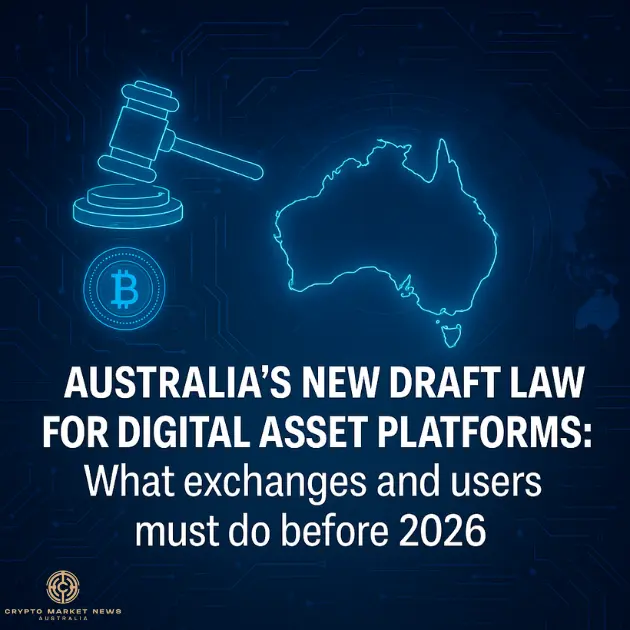The Albanese government has released a new draft legislation for regulating digital asset platforms and crypto exchanges. The legislation will update the Corporations Act 2001 to establish a new framework for digital asset businesses in Australia. It will also tighten the existing crypto financial frameworks while still leaving space for innovation.
“The draft legislation released today aims to amend existing law to bring digital asset platforms within the regulatory remit of Australian Financial Services law, to create more certainty for industry participants and consumers,” says Assistant Treasurer Daniel Mulino in a statement.
The move is part of the Albanese government’s March 2025 commitment to create a comprehensive crypto framework that will spur innovation and increase competition by providing certainty to the digital industry.
Treasury has opened a one-month consultation period, during which industry players and other stakeholders can submit their views. The feedback period closes on 24 October 2025.
The scope and requirements of the draft legislation
The Treasury Laws Amendment (Regulating Digital Asset and Tokenised Custody Platforms) Bill 2025 introduces two new regulated product categories: Digital Asset Platforms and Tokenised Custody Platforms.
A digital asset platform (DAP) is defined as an entity that holds digital tokens on behalf of clients. It may also enable them to buy, sell, transfer, or simply use the tokens. This means that centralised exchanges, brokers, wallets, and trading platforms fall under the DAP category.
On the other hand, a tokenised custody platform (TCP) is an entity that creates and redeems tokens and is responsible for delivering or holding them for clients. They are similar to DAPs in that they can also allow transactions, but they use tokens instead of accounts to register asset owners. They can be wrapped tokens, staking-as-a-service models, or any business where client assets are stored.
The new draft legislation states that anyone providing services that fall under DAP or TCP service will be required to abide by the Corporations Act 2001. This means that they need to hold an Australian Financial Services Licence (AFSL), the same licence required for traditional financial service providers.
Generally, AFSL requires that all provided services be efficient, honest and fair, and the providers are mandated to meet a variety of well-understood conduct, reporting and compliance requirements.
The Australian government decided to use the existing financial framework for DAPs and TCPs instead of creating a new one to avoid complexity. The move also ensures that consumers of digital products benefit from the same protections as other financial products.
However, ASIC is also developing some extra industry-specific standards for DAPs and TCPs. These touch on a platform’s transaction and settlement functions and its arrangements for holding client assets, aligning with how ASIC treats other financial services.
Further, DAPs and TCPs will be required to explain to consumers how their services work. This document will need to cover custody and use of digital tokens, fees and charges, associated risks, and the reporting and rights available to clients.
Tough penalties, exemptions for small operators
DAPs and TCPs that breach the upcoming laws will face penalties of up to AUD 16.5 million (USD 10.8 million), three times the benefit obtained from the breach, or 10% of the entity’s annual turnover – whichever is higher.
But while the goal is to protect consumers, the government is also keen to avoid crushing startups with high compliance budgets.
“Small, low-risk” operators are exempted from the regulatory burden. These are service providers that hold less than AUD 5,000 (USD 3,306) per customer, and their total annual transaction value doesn’t exceed $10 million. According to Assistant Treasurer Mulino, the exemption is consistent with how the government treats other financial products like non-cash payment facilities.
However, the issuer needs to notify ASIC that it intends to rely on the exemption.
Closing regulatory gaps
The Albanese government has been working on a comprehensive framework that addresses all aspects of the digital ecosystem. To maintain flexibility and uniformity, most of the work has been integrating digital products into the existing financial regulatory framework while also creating new applicable crypto-related policies.
The new law doesn’t touch on digital assets, as these already fall within existing frameworks. However, the government has also been wary of the risks consumers face from asset holders, inspired by the 2022 FTX collapse that wiped out $8bn from customers and $1.7bn from investors.
The new draft legislation focuses purely on custody-based business models, aiming to address the same issue. These models are common across the digital asset space and include trading platforms, broking services, wallets, and tokenisation products.
Most intermediaries are already regulated under different laws in Australia, but the proposed law targets those that hold large volumes of digital assets, especially those that aren’t financial products.
According to the government, the nature of these tokens makes it easier to transfer and pool assets quickly, making it possible for an unregulated platform to hold billions of dollars in client assets. Consumers can then face issues such as frozen withdrawals, insolvency proceedings, commingling with provider funds, undisclosed proprietary trading, weak governance and disclosure, fraud, and cyber theft.
The proposed legislation will now bring high-value digital asset holders under the same rules already applied to other entities with related or similar products in traditional finance. Treasury phrases it as “same activity, same risk, same regulation.”
What this means for exchanges and users
In light of the new draft legislation, crypto businesses in Australia and those planning to expand to the country need to evaluate their business model. If it falls under “Digital Asset Platforms” or “Tokenised Custody Platform”, they then need to consider whether they qualify for the exemption based on their holdings and annual turnover.
For larger businesses, the end result will be applying for AFSL licensing and adhering to the governance structures and compliance reporting requirements set by ASIC.
For consumers and investors, the draft legislation will increase trust in Australian exchanges and custody platforms, encouraging greater participation.
Mulino states that “This is about legitimising the good actors and shutting out the bad. It is about giving businesses certainty and consumers confidence.”

